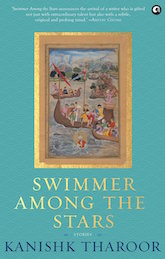Swimmer Among the Stars
Kanishk Tharoor
|
|
Kanishk Tharoor was 10 or was it 11 when he first heard the story of how an elephant was once shipped from Kerala as a diplomatic gesture to please a Moroccan princess. Years later, on a trip to the country, the memory of the tale crested. “I think what stuck with me was the incongruous image of this poor elephant and its mahout, ‘driving’ along in a diplomatic convoy on the road from Casablanca to Rabat,” he said over email from New York City, where he lives with wife, poet Amanda Calderon (they married earlier in 2015). “There seemed something wonderfully anachronistic about it, a scene from another time.” Elephant at Sea opens this debut collection of dozen deftly wrought short stories, titled Swimmer Among the Stars, by a refreshingly profound and gifted 31-year-old writer. It starts on a humorous note when the Indian official at the embassy receives a perplexing telegram intimating him that an elephant is enroute. He even mulls the possibility of it being a code. Then it slowly suffuses a tragic and complex hue as the elephant, accompanied by its mahout, land on the unfamiliar shore. As they embark on the lonely voyage to the capital, the man and animal, two strangers in a strange land, their delicate fate distend. One night the mahout whispers to the elephant: “If you dream, don’t dream of home and don’t dream of me. Dream of the sea. You and I are so alone in the world…”If there’s a theme that percolates through the stories, it is a sense of being torn, of displacement and estrangement that the characters (be it humans, animals, or states) come to confront. Kanishk maintains the theme of alienation does not stem from his own “far-flung upbringing”, but how they have become key aspects of our modern world. In the short story lending the title to the collection, Swimmer Among the Stars, “the last speaker of a language” is being interviewed by a group of ethnographers. The woman finds it strange to listen to the sounds of her mouth. “You must understand she says, my memory is preserved better than a lemon, it is difficult to remember which words are my own and which words are not.” In The Fall of an Eyelash, Forlough’s family help smuggle her out of the country, a desert, to a place which is “green and made from clean lines for safety”. She’s homesick. In this strange land, the new people admire her courage and keep asking her to repeat her story, not realising “that while an exile can escape her country, she can never escape her exile.” Slowly she learns the new customs. She discovers how wishes can come true from fallen eyelashes. The story, Kanishk says, is loosely inspired by the life of a family friend. Although it was written long before the Syrian refugee crisis, it finds a particular resonance in the present context. “My twin Ishaan [journalist with Washington Post] has written copiously and probingly about the crisis,” he said. “We grew up hearing my father’s stories from his work in Singapore for UNHCR, when running camps for the so-called ‘Vietnamese boat people’. One of the objects in our bedroom growing up was a model of a boat the Vietnamese refugees would have taken to get to Singapore. It was given to my father as a gift by the refugees for his great work in their camps.” Kanishk admits he and Ishaan have had somewhat of a “peripatetic childhood”. Their father, Shashi Tharoor, Indian parliamentarian and author, was at the time working for the UN. Born in Singapore, they were raised till five in Geneva, did some early schooling in Calcutta, and then “lobbed up” in New York City, the place where they did the most of their growing up. Summer holidays would entail spending time with their mother, Tilottama Mukherji, a humanities professor at New York University, and her family in Kolkata. “Our parents encouraged us to read and to write from an incredibly young age,” he said. “I remember tapping out utterly improbable stories about a Mauryan empire naval captain on my father’s old blue screened word processor when I was about 10.” Kanishk and Ishaan both went to Yale, where he acquired a fellowship in the creative writing program. Academia has played an indelible role in his life. At Yale, he says, he couldn’t choose between his two academic loves, literature and history, so he double majored in both. As a career, he chose fiction over academia because of “less patience” for its prose. One of the haunting allures of Swimmer Among the Stars is that the stories are not only intricately knit, but in them the grazed walls of literary conventions fold and merge. Death and destruction recur as grim reminders that the world is always ending for someone, somewhere. A United Nations in Space is about diplomats, referred to only by the name of their countries, stranded in a space station on a near Earth-orbit, because the world is no longer safe. Tale of the Teahouse chronicles the final seven days of a nameless town awaiting its impending doom as an invading army approaches. The Loss of Muzaffar, one of the earliest written stories in the collection, is about a curious cook, who decides to prepare a fatal dish with precious stones. Kanishk’s deep-found love for artful sentences and history help him retell the mythical “episodes” from Alexander romance / Iskandarnamah in The Mirrors of Iskandar. A lot of research went into it, he says. “It required that I read translations of many versions of these fabulous, conflicted epic tales, from the ancient Armenian to medieval Persian to Oghuz Turkic.” The 14 short stories within the story not only conjure Alexander the Great as someone who once lived and dreamed, but it reveals the myriad gems of wisdom myths and fables possess. Swimmer Among the Stars is a mesmeric introduction to a writer who must neither be judged by his second name nor age. It is the work of a storyteller who stands lucid on the cusp of reinventing storytelling. The year 2016 couldn’t open on a more subtle alchemy for Indian literary fiction. Mark Tully | 21 Feb 2015 | LiveMint
|


 Kanishk Tharoor
Kanishk Tharoor